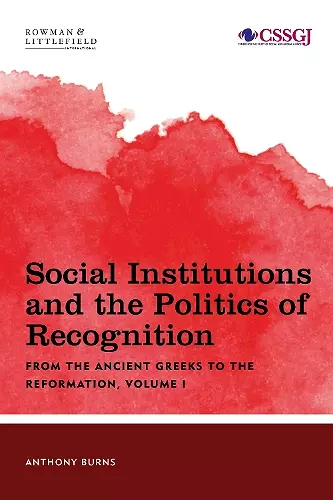Social Institutions and the Politics of Recognition
From the Ancient Greeks to the Reformation
Format:Hardback
Publisher:Rowman & Littlefield International
Published:20th Aug '20
Currently unavailable, and unfortunately no date known when it will be back
This hardback is available in another edition too:
- Paperback£37.00(9781783488797)

This volume explores the politics of social institutions from ancient Greece to the Reformation, emphasizing authority and individual responsibilities within these structures.
This first volume of a comprehensive three-part series delves into the intricate politics surrounding social institutions, tracing their evolution from ancient Greece through to the Reformation in the sixteenth century. The author, Tony Burns, emphasizes the importance of civil-society institutions that exist in the intermediate space between the family unit and what Hegel describes as 'the strictly political state.' This exploration reveals how these institutions influence and are influenced by political dynamics throughout history.
In Social Institutions and the Politics of Recognition, Burns argues that the internal workings of social institutions are crucial for political studies. He highlights the concepts of authority and individual responsibility within these structures, drawing on the philosophies of notable thinkers such as Plato, Aristotle, Cicero, and many others. By examining their perspectives on authority and hierarchy, the book provides a rich context for understanding how power dynamics have shaped social institutions over time.
The work also scrutinizes the relationships between authority figures and their subordinates, offering insights into the moral and ethical considerations that underpin these interactions. Through this detailed analysis, Social Institutions and the Politics of Recognition invites readers to reconsider the role of social institutions in the broader political landscape, encouraging a deeper understanding of their significance in both historical and contemporary contexts.
This book, the first of three volumes, links the politics of recognition to the evolution of Western social institutions. It challenges not only those who associate the politics of recognition with late-20th-century multiculturalism but also someone such as Craig Calhoun, who pushes its foundation back to Hegel’s civil society theory. Burns (Univ. of Nottingham, UK) sees evidence of premodern origins and makes it his task to trace how increased societal differentiation was wedded to developments in the significance of recognition. The book is organized into two parts. The first provides discussions of ancient Greece, Rome, and medieval Christianity. The second picks up the narrative in the late Middle Ages, beginning with “corporation theory,” in which figures such as Nicholas of Cusa and Jean Bodin loom large. The study concludes with a discussion of the Protestant Reformation, focusing on Martin Luther and John Calvin. This is high quality and engaging intellectual history. Burns succinctly summarizes his argument at the end, namely that the non-state institutions that developed in the premodern world prior to the emergence of civil society called for recognition and in so doing sowed the seeds of democratic decision-making. Summing Up: Recommended. Graduate students and faculty.
* Choice *Burns has produced a magnificent contribution to the history of political thought by shifting the analytical focus from the state to the institutions of civil society. The first of three projected volumes reminds us that concern with social recognition is by no means confined to modernity, but has been theorised extensively from ancient times to the Reformation. -- Lawrence Wilde, Emeritus Professor of Political Theory, Nottingham Trent University
Tony Burns casts the politics of recognition against the backdrop of the history of political thought and social theory from Ancient Greece to the Enlightenment. In doing so, he forces us to rethink the relationships between recognition, authority, corporatism, and anarchy. A much-needed study for thinking about recognition. -- Jeffery Nicholas, Associate Professor, Providence College
An adventurous and scholarly book that stretches our notion of recognition and widens the horizons of our conceptions of the political. It adds to our understanding of the history of political thought in the ancient, medieval, and early modern worlds. It is an excellent read, and whets our appetite for the forthcoming volumes in the projected trilogy of books on recognition.
-- Gary Browning, Professor and Associate Dean, Department of Social Sciences, Oxford Brookes UniverISBN: 9781783488780
Dimensions: 234mm x 160mm x 28mm
Weight: 621g
298 pages